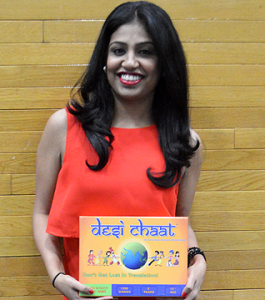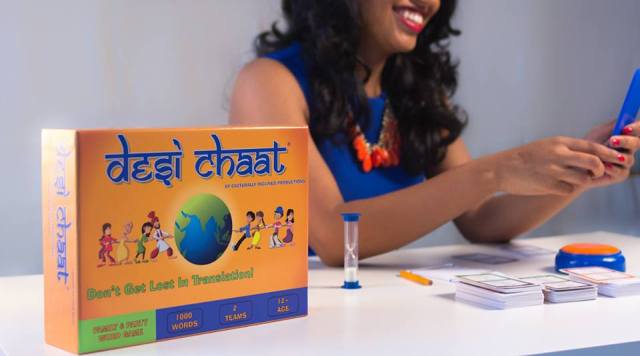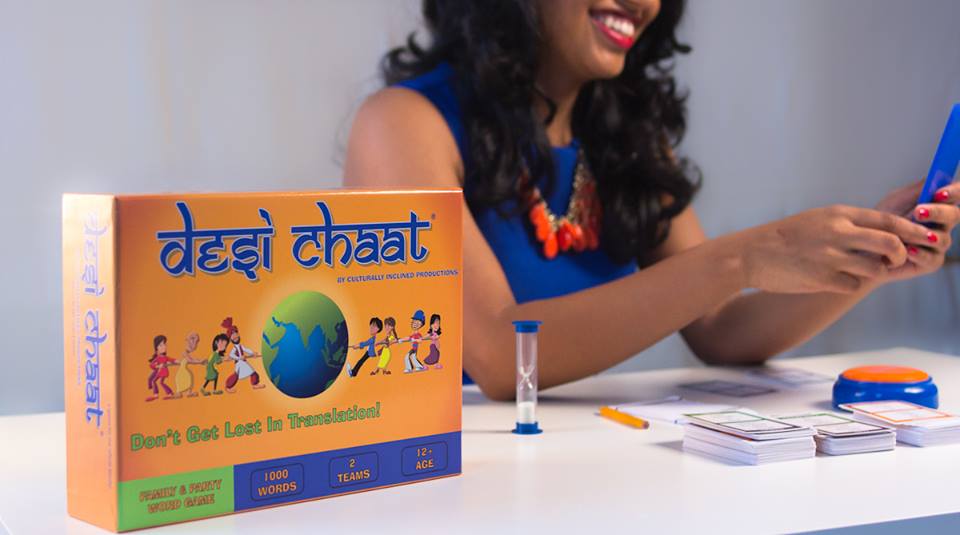Jeffrey Eisenband, April 30, 2014
 Priya Shah?s life was stable. She earned a bachelor?s degree in communication and economics from Rutgers in 2011. Out of college, she started work at a marketing firm in New Jersey. For someone who was born in India and immigrated to the United States at age three, the progression of life appeared ideal.
Priya Shah?s life was stable. She earned a bachelor?s degree in communication and economics from Rutgers in 2011. Out of college, she started work at a marketing firm in New Jersey. For someone who was born in India and immigrated to the United States at age three, the progression of life appeared ideal.
But sitting in an office was not ideal for Priya Shah. It was not her idea of the American Dream. Shah had bigger aspirations.
She wanted to create a party game geared toward South Asians.
?I wasn?t too passionate about the job, so whenever I was done with work, I actually had a purple notebook, and I would start writing down words and their clues,? Shah, 24, says. ?When things got more serious, I told my parents I really want to make this happen. They said if you want to do this, we?ll support you.?
Shah traded in her cubicle for the dining room table in her childhood home in Edison, N.J. She exchanged co-workers with parents.
Shah?s idea was to create a Taboo-like game for South Asians. Games such as Taboo feature aspects of American culture and English. Shah imagined a communal game for South Asians. Rather than deal with the language and culture barriers of South Asians playing Taboo, she wanted a game suited for South Asian culture and vocabulary.
The desire for a game stemmed from Shah?s childhood in central New Jersey, an area of the state she refers to as ?Brown Town,? and her college experience at Rutgers. A part of Kappa Phi Gamma Sorority, Inc. and the Association of Indians at Rutgers, Shah was in the middle of South Asian culture on campus. She was around the dance competitions, cultural shows and philanthropy events of the Indian community, but she could not understand the lack of leisure options.
?I realized there were no games that South Asians could sit down and play and have in front of them and have a physical piece to play. I thought ?this is crazy?,? she says.
Out of college, she began brainstorming ideas. She mapped out words and their clues. Shah bought more notebooks. She studied the legality of names. She studied what made games successful. She studied how to supply games. She studied how to import from China. She studied how to get a product trademarked.
?I had to study everything before I realized what I needed. I had to know what I could not do, along with what I could do,? she says.
Shah?s parents, Lata and Sharad, had not even played Taboo when Shah made her initial pitch, but they believed in her. They saw Shah scribbling into her notebooks, ordering books on developing games and toying with Adobe Illustrator. They put their trust in her drive.
They also had a stake in the game. With its headquarters in their house, Lata and Sharad had influence. As Shah organized the words at the dining room table, her parents pitched in. After all, they had more experience in South Asian culture than she did.
?My dad went through the excel sheet. He?d go over what was right, what was wrong, even what might be offensive,? Shah says.
?She wanted a parent?s perspective of what words they would say and then chose her own words and then combined them together,? Sharad says. ?We spent months going over the words and editing them.?
The two-year project came to fruition this past December, when Desi Chaat hit the market. The initial product contains 250 cards with 1,000 words, all with South Asian ties.

The term ?desi? translates to anyone of South Asian descent. Meanwhile, ?chaat? is a double entendre. It translates to a mixture of words, regions, foods, dances, and customs (like the meaning of the phrase grab bag or the word miscellaneous). For English-speakers, it may be easier to take the direct phonetic translation of ?chat.?
Shah is enthused with Desi Chaat?s initial roll-out. Thanks to sorority sisters, friends, and family, the game has expanded out of New Jersey as far as Florida, Texas, California, Virginia, and Minnesota. Shah has heard stories of families putting a twist on the game and playing it in their native languages.
There is certainly room for Shah?s business to grow. Officially, she is the founder of Culturally Inclined Productions, with its lone product being Desi Chaat. Shah is looking to expand Desi Chaat?s outreach to Canada, the United Kingdom and India. In a world that makes it very easy for South Asians to be skeptical of their culture, Shah wants to give them something of their own.
?I feel like a lot of kids are embarrassed or shy away from [their culture] and I think they shouldn?t. You have the opportunity to connect with almost 2 billion people,? she says.
From Sharad?s parental perspective, he sees the game as connector between old and new generations.
?The words bring out stories and fun experiences that people have had in India or even here so in that way people make connections!? he says. ?There are historical words but there?s also pop-culture and ?new? things, so it?s a good mixture for anyone to play.?
Shah?s Desi Chaat blast will continue, as she attempts to give her product some global engagement. If successful, Desi Chaat made be the first of multiple endeavors.
?I do have different ideas. Right now, I?m focused on getting in the door.?
Check out Desi Chaat on https://culturallyinclined.com/







